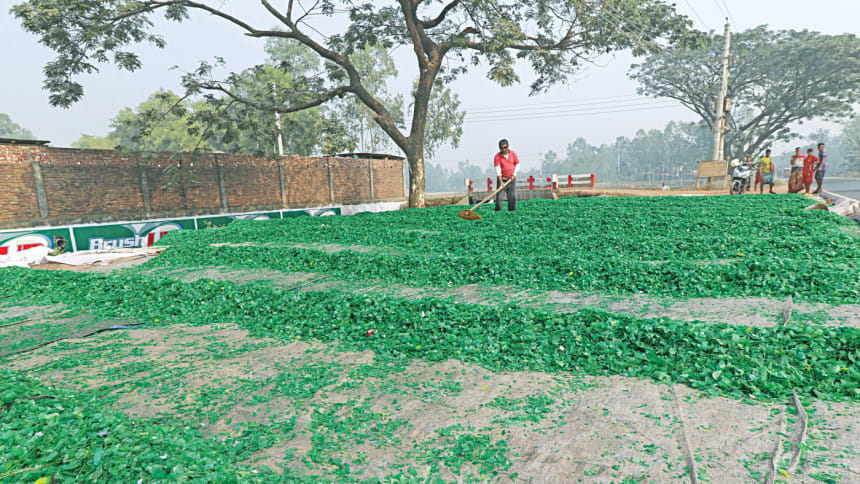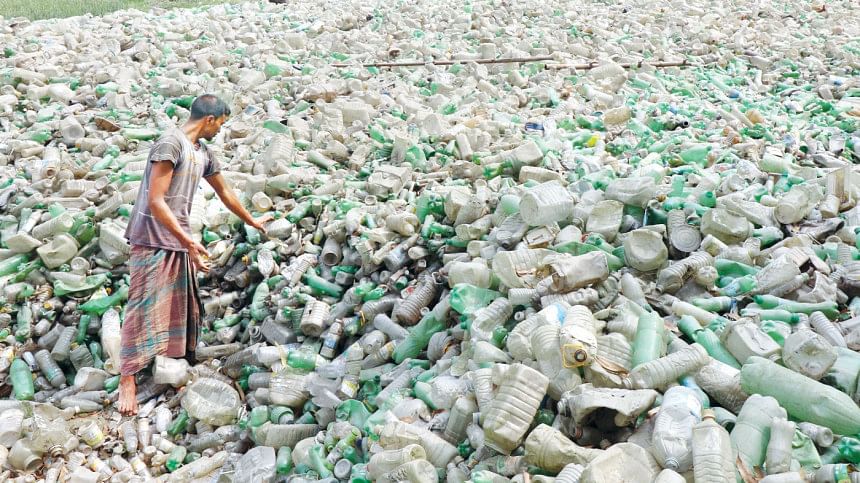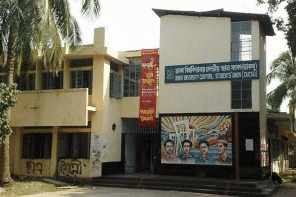Plastic recycling takes hold in northern districts

People of Rangpur and Dinajpur regions have found a solution to the plastic menace as nearly 1,000 plastic recycling factories have sprung up across eight districts
Bangladesh's northern region has turned into a plastic recycling hub as many people in eight districts are now engaged in turning hazardous waste such as discarded PET bottles and disposable syringes back into resources for these products.
Plastic has long been an integral part of human life across the globe even though its continued use poses a significant threat to the environment.
And in the absence of proper management, the growing number of discarded plastic products is starting to take its toll in Bangladesh.
However, the people of Rangpur and Dinajpur regions seem to have found a solution as nearly 1,000 plastic recycling factories have sprung up across eight districts in the region.
Aside from the obvious benefit of ensuring a cleaner environment, the initiative has generated employment for many locals, most of whom learned about how to recycle plastic from YouTube.

Environmentalists in the two districts said that thousands of tonnes of plastic waste are produced in the country each day.
This waste can be found lying on the ground and choking waterbodies due to the lack of proper monitoring but thanks to the introduction of recycling plants, pollution has decreased at the local level while also generating employment for many marginal people.
Md Moti, a resident of Debiganj village under Dinajpur's Chirirbandar upazila, said he started his discarded plastic recycling business beside the Dinajpur-Rangpur highway with about 20 employees two years ago.
Moti crushes the plastic waste into crumbs after collecting them through ragpickers.
After processing, the plastic chips are sold to factories in Dhaka and other districts that use them to make new products.
Ragpickers can earn about Tk 200 daily by selling collected plastic products to scrap shops and traders such as Moti, who prefer to buy easily recyclable items such as disposable bottles and syringes.
Moti sells the plastic chips for between Tk 8 to Tk 60 per kilogramme depending on their quality.
"The innovative business of recycling discarded plastic is changing the quality of life in the region while also reducing pollution," he said.
During a recent visit to different places in Dinajpur, Rangpur and Nilphamari, this correspondent found huge piles of discarded plastic items in the yards of local recycling plants.
Workers were seen drying processed plastic crumbs while others were busy breaking up various items taken from the pile.
Kabita Rani, a resident of Panga Matukpur village under Domar upazila of Nilphamari, has earned around Tk 5,000 per month ever since a plastic waste recycling factory opened in the area.
Like her, many other local people got employment there.
Kabita sells discarded plastic items to traders after collecting them from different places. She even works at the factory itself by sorting discarded plastic items to make extra earnings.
"I can support my family through the earning," she said.
Tapan Roy, a machine operator at the recycling factory, said his task is rather simple as it requires him to just operate the crumbling machine while others sort out the plastic chips after cleaning them.
After cleaning, the chips are dried in the sun before being packaged for sale, he added.
Atia Parveen, a resident of Kamarpukur village under Saidpur upazila of Nilphamari, also found a better living through the factory.
"My four-member family is living better than ever," said Parveen, who was previously a housemaid.
Kamal Roy, owner of the plastic recycling plant, said he sells the chips to millers while much of the product is even exported.
"This plastic waste is reused for manufacturing plastic products," he said.
Roy went on to say that he learned about plastic waste recycling from YouTube and following his success, many people are now leaning towards this profitable business.
Imran Hossain, owner of a plastic recycling plant in Bangalipur village of Saidpur, said they buy old plastic bottles from various scrap shops at prices between Tk 20 to Tk 35 per kilogramme.
The waste is then washed in machines to rid them of any hazardous material before being dried and crushed.
"I think the industry could have expanded further by now with government support," Hossain added.
Bijan Kumar Roy, assistant director of the environment department in Rangpur, said plastic waste is a major threat to the ecosystem and so, the idea of recycling discarded plastic products is amazing.
"It is a great concept to protect the environment. Besides, many are becoming self-sufficient by working in these factories," he added.

 For all latest news, follow The Daily Star's Google News channel.
For all latest news, follow The Daily Star's Google News channel. 



Comments